Search
Showing 10 of 1855 results for how to register international groups
-
February update from Immigration New Zealand
Update on Student visa processing*
Since New Zealand’s international borders reopened in August 2022, Immigration New Zealand (INZ) has received 25,471 student visa applications from international students outside of New Zealand. We have decided 17,601 of these applications, with more than half of our decisions made in under four weeks.
*Figures current as at 10pm on 30 January 2023.
We have updated our reporting
INZ is improving the way we publicly report on processing times for different visa categories. We now publish the processing times for applications decided in the previous month, instead of the previous three months.
The website illustrates the median number of days, along with the actual number of days it takes to process 90% of applications. These new metrics give a good indication of what customers can expect, regardless of the complexity of their application.
Check out our updated processing times here: How long it takes to process a visa application | Immigration New Zealand
Apply for visas at least 8 weeks ahead of intended travel date
New Zealand is in the middle of our student processing peak period. You can apply up to three or four months ahead of intended travel if you wish, however please ensure that applications are applied for at a minimum of 8 weeks ahead of intended travel date.
INZ generally processes applications in date order and the course start date is also taken into consideration.
We appreciate that students are keen to have their travel bookings confirmed given the cost of flights and flight route limitations, however INZ recommends that students do not confirm travel bookings until a visa has been granted. If students still wish to book travel ahead of a visa decision, we recommend that they explore flexi travel dates or refundable tickets.
Student visa checklists
The student visa checklist is key to submitting a complete student visa application that has the information we need to make a decision. We update the visa checklists regularly, so be sure to use the web link rather than download the checklist. The first time international students visa checklist was last updated in December 2022.
-
New Zealand open and ready to welcome Colombian students
More than 80 guests, including university authorities, school directors, government stakeholders, and education agents attended the event, which was opened with a haka performed by ENZ Manukura – Chief Advisor Māori Ed Tuari and Āriana Ngārimu-Goldsmith, Advisor Māori.
One of the highlights of the event was the launch of Education New Zealand Manapou ki te Ao’s I AM NEW kākahu campaign in Spanish.
The I AM NEW kākahu marketing campaign was launched at NAFSA 2022 in May and features the stories of eight international students from China, Colombia, Germany, India, Japan, Thailand, USA, and Viet Nam. The students worked alongside Māori fashion designer Kiri Nathan to collaborate on the design of a new type of education garment that embodies cultural values that make New Zealand education unique.
Bryann Avendaño is the Colombian student featured in the campaign. His kākahu gown was on display at the event and he narrated the accompanying campaign video in Spanish (you can watch the video here)
“New Zealand has its eye on all things new,” Avendaño told the audience.
“How to think ahead for next generations, and this is the gown for the next generations. The way the gown is made by many hands and with a lot of thought put into it, it’s kind of an analogy of how science is made. It’s a collective effort to create new things, innovate, and make the world a better place.”
ENZ’s Director of Engagement – Latin America, Javiera Visedo, said Bryann’s message was a powerful and impactful.
“The video and the message he shared was so powerful, especially because it was made in Spanish, his native language.
“People were really impressed and proud to see a Colombian student feature in ENZ’s global brand campaign.
“Everyone appreciated how New Zealand’s international education includes and celebrates Colombia. It was perceived as honest, genuine, and authentic in a way that really represents New Zealand’s values and celebrates New Zealand’s culture.”
Some education agents said that it was a great way to promote New Zealand as a study destination, without being too explicit, and that they understood New Zealand’s biculturalism much better now.
ENZ’s Manukura – Chief Advisor Māori, Ed Tuari said he enjoyed the opportunity to connect with local agents and government officials and provide an opportunity to open a window to te ao Māori. “It was great to be able to support the opening campaign by interweaving aspects of tikanga (protocols) which included performing a haka, which definitely got their attention!
“We all believe in the value of international education nurturing global connections and the power of education to advance dialogues related to engagement of our indigenous people, social justice and climate.”
-
Study with New Zealand online launched for adult professional learners
The Study with New Zealand Online platform – an outcome of the Strategic Recovery Plan for International Education 2020 – is a New Zealand owned and branded platform that offers global learners a new way to engage with a New Zealand education.
Study with New Zealand Online has up to 60 courses available from 20 + education providers.
ENZ’s General Manager – Sector Engagement, Wendy Kerr, said the pilot learning platform aims to tap into the adult professional learner market.
“Our research shows that there is a significant career-oriented, adult learner market that is looking for ways to advance within their current career. Study with New Zealand Online aims to tap into that market and test if there is value in what New Zealand can offer uniquely.
“Good examples of courses unique to New Zealand are a short course on sustainability in the wine industry delivered by NMIT | Te Pūkenga. If you are in the wine industry, you clearly know New Zealand wines and our expertise in sustainability. The same goes for an ECE course offered by Te Rito Maioho ECNZ, which showcases New Zealand’s bicultural approach in this field.”
Kerr says, “We know how hard the pandemic was on international education. We know this project is about exploring new and different ways to deliver, and new and different audiences for, the New Zealand education experience. The goal is to diversify and build resilience.”
Findings from the Study with New Zealand Online pilot will help inform insights and recommendations on how New Zealand’s education sector could transform to a more sustainable future state through the diversification of our international education offerings.
Visit Study with New Zealand Online on https://online.studywithnewzealand.govt.nz/
-
High-level delegation visit strengthens education relationship with India
The New Zealand India Education Week – held from 17-22 April – included senior level participation from New Zealand universities and was designed to further strengthen the strategic education partnership with India.
Education New Zealand Manapou ki te Ao (ENZ) Chief Executive, Grant McPherson, led the delegation across New Delhi, Mumbai, and Chennai.
Demonstrating New Zealand’s overall commitment to India, New Zealand announced an investment of $400,000 towards internationalisation and student mobility initiatives, including the relaunch of the New Zealand Excellence Awards (NZEA).
The NZEA are unique scholarships designed exclusively for Indian students that are jointly funded by ENZ and all New Zealand universities. Since their launch in 2016, the scholarships have enabled more than 200 Indian students to study at one of New Zealand’s universities.
Another key focus for the week was to re-engage with the New Zealand Centre at Indian Institute of Technology (IIT) Delhi and discuss the future trajectory of the partnership.
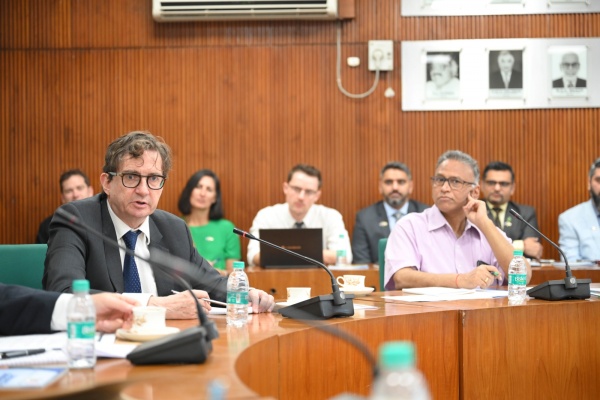
New Zealand High Commissioner to India His Excellency Mr David Pine speaking at a meeting with the Indian Institute of Technology Delhi.
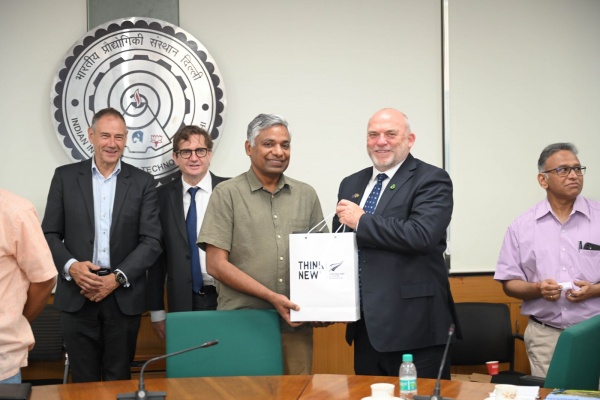
Caption: Education New Zealand Manapou ki te Ao Chief Executive, Grant McPherson (right), thanking Indian Institute of Technology Delhi (IITD) outgoing Dean International Naveen Garg (left) for hosting the NZ delegation at IIT.
Erik Lithander, Deputy Vice Chancellor Strategic Engagement at the University of Auckland, signed an MoU with IIT Delhi on behalf of all New Zealand universities to continue the relationship and further develop the New Zealand Study Centre.
The New Zealand Study Centre was inaugurated at IIT Delhi in February 2020 by Deputy PM Winston Peters, demonstrating the importance of education as a key part of the India-New Zealand relationship.
The week was bookended by two education agent fairs in New Delhi and Mumbai respectively, both of which exceeded expected student attendance numbers.
Speaking at a media briefing held at the New Zealand High Commission in New Delhi during the New Zealand India Education Week, ENZ CE Grant McPherson underlined the importance of New Zealand’s education partnership with India.
“India is one of New Zealand’s priority partner countries for collaborations, exchanges, and student mobility. We are excited that the announcements around the New Zealand Centre strengthening and the extensive package of scholarships under the New Zealand Excellence Awards scheme will further engagement with India,” Grant said.
ENZ Regional Director – Asia, Ben Burrowes, said with the sector’s focus on recovery and reconnections, the New Zealand India Education Week provided a great opportunity to refresh relationships with education sector stakeholders in India.
“India has always been a strong partner to New Zealand in the education space, and students from India consistently make up the second largest portion of international students studying in New Zealand.
“We are delighted for the opportunity that the New Zealand India Education Week offered us to reconnect and refresh our education links with India, and we look forward to building this relationship further over the coming years.”
Additional info –
To begin the week, sector representatives were provided with in-depth insights into the India-New Zealand relationship from High Commissioner David Pine, ENZ in-market staff and a consultant from EY. Representatives attended meetings with government departments such as the University Grants Commission (UGC) as well as B2B institutional networking events to support their university's global engagement. The delegation also met with two Indian Institutes of Technology (IIT), IIT Delhi and IIT Madras.
-
Celebrating the University of Auckland’s 140-year journey in China
The University of Auckland recently commemorated its 140-year journey in China with a series of events held in six major cities across China, including Beijing, Guangzhou, and Chengdu. The celebrations took place from the 12th to 22nd May and were co-hosted by the University of Auckland, the University of Auckland International College (UP Education) and the University of Auckland English Language Academy. Education New Zealand’s Manapou ki te Ao (ENZ) China based team provided on-the ground support throughout the ten days of events.
Michael Zhang, ENZ’s Regional Director for Greater China noted the success of the commemorations in showcasing the study experience at New Zealand’s biggest university while fostering connections with agents and prospective students in China.
“Marking this anniversary milestone for the University of Auckland in China was a special occasion and proved a good opportunity for the University to rebuild international education connections with its Chinese stakeholders, highlighting its programmes and offerings.
“ENZ enjoyed being part of the celebrations, helping facilitate reconnections, and it was a fantastic opportunity to raise awareness for New Zealand amongst agents and parents. This was the largest New Zealand provider-hosted series of events in the post-Covid era in China,” said Michael.
Beyond providing updated information about academic programmes, the events also featured inspiring testimonials from alumni in China who shared their study experiences at the University of Auckland. Promoting such narratives helps to further strengthen New Zealand and the University’s reputation and influence in China.
The resounding success of the events and the positive response from attendees reflect the strong recovery of the international education sector, including for New Zealand as a destination, in China.
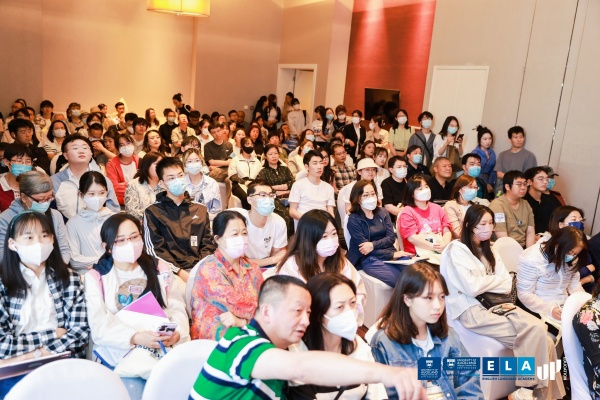
Standing room only at the Beijing students’ information session
-
NZ EdTech’s taking a diversified and leading message to the Australian digital education market
ENZ had a stand at NZTE’s pavilion with six of the eight EdTech who had expressed an interest in attending EduTech as part of an ENZ delegaton, showcasing their products alongside NZTE’s five customers. The companies in the ENZ delegation included Pacific Kids' Learning, Nutriblocks, PipiLearning, Jix Reality, PolyMath and Code Avengers and the Student Volunteer Army were also part of the wider ENZ delegation. This diverse group of technology providers from K-12 to Vocational Training and Education (VET) and Higher Education (HE) provide a range of digital education solutions including numeracy, literacy, financial literacy, STEM, programmes for neuro diverse learners, Pacific based and culturally responsive digital tools, immersive digital education experiences and health and wellbeing educational games.
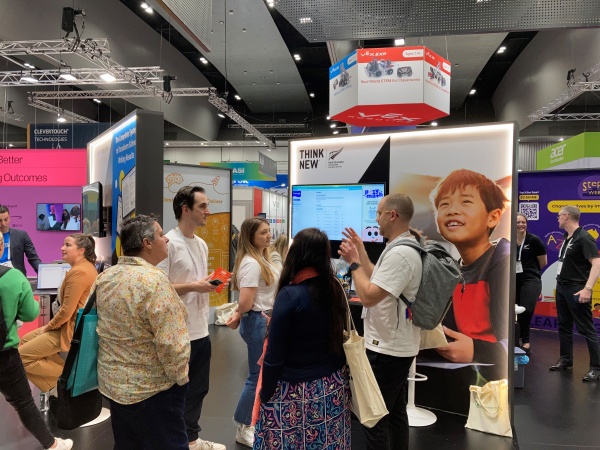
PolyMath Co-Founders Sophie and Christian Silver (second and third from left) talking with attendees at their EduTech Melbourne 2023 stand.
ENZ’s participation supports Focus Area Two of the New Zealand International Education Strategy which is to ‘Build a new international education future’. In taking NZ EdTech offshore, ENZ’s goal is to show how Aotearoa New Zealand is leading in education innovation while also helping NZ EdTech companies explore and understand the export opportunity in Australia in a low-risk and low-cost way.
ENZ’s Business Development Manager | Kaiwhakawhanake Pakihi, Alana Pellow, said that having a stand on NZTE’s pavilion gave ENZ’s delegation profile and extra visibility during the Expo. This included the opportunity to promote their products, a presentation slot to pitch their products, visibility of their collateral and the opportunity to engage with expo attendees over the two days of the event.
“All six EdTechs on our stand generated a total of 80 prospective customer and partner leads, with one company signing a contract with a local university while there.
“All met with decisions makers and government education officials, explored opportunities to partner with other NZ EdTechs and refined their thinking and business planning on the opportunities presented by the Australian market. They all referenced the significant value of being ‘in market.’”
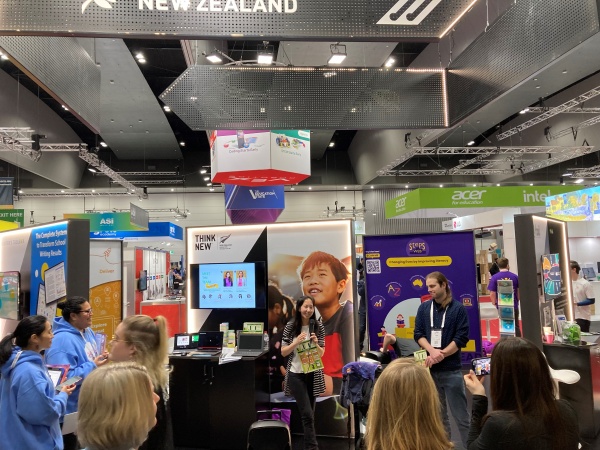
Nutriblocks Co-Founder Dr Claudia Leong and Tech Programme Developer Tim Kern presenting at EduTech Melbourne 2023.
ENZ also sponsored the NZTE networking dinner for the combined 13 EdTech businesses. Invited guests included representatives from the Victorian Department of Education and Training, Victorian Association of State Secondary Principals, Matterworks/Board Director and the NSW Department of Education. Both Education Departments set the scene for the education technology landscape in NSW and Victoria and the journey both states are on in digital adapting and adopting specifically in K-12.
ENZ also supported giving broader visibility of Aotearoa New Zealand’s expertise in digital education and secured two speaker sessions for the EduTech VET conference stream. Norie Ape, Digital Product Manager for Te Pūkenga, presented on ‘Collaborative Innovation: Transforming Vocational Education through Technology and Work Based Learning’ while Elizabeth Asbury, Director of Pipi Learning also spoke on ‘Cultural responsive and designed for neurodiversity in the Vocational Education and Training sector’. Both sessions were well attended and Norie and Elizabeth have been approached for further discussions involving contracting their EdTech services.
Norie said it was a huge privilege to spend time together connecting on our shared passion for better outcomes for our learners, employers, and our colleagues.
“We had two incredible days of meeting, learning, and collaborating in person with awesome humans using Tech 4 Good in Melbourne. Time now to recover and setup all those post conference connections to further the new relationships forged and consider how to embed new ways of collaboration in and beyond.’’
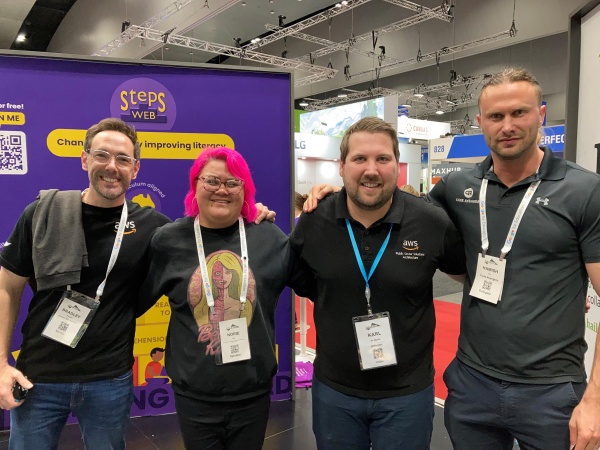
Norie Ape, Digital Product Manager for Te Pūkenga (second from left) with Code Avengers Founder, Hamish Day (far right) and Bradley Hansen (left) plus Karl de Borst (second from right) of Amazon Web Services.
At the conclusion of EduTech Melbourne 2023, Alana shared here top three takeaways from the conference.
“Firstly, nothing beats being on the ground in market, to understand the needs of educators and the opportunity that exists.
“Secondly, there is power in the collective ‘we’ when Aotearoa New Zealand turns up en masse, in market. Collaborating and having deep relationships with other NZ Inc agencies adds greater support to the sector and provides one door to our government, truly putting the customer at the centre.
“My last takeaway is how the Australian education ecosystem is embracing all that technology offers without throwing learners or indeed educators to the kerb. We could learn more from our Australian education colleagues and how they are using digital to create competitive advantage that supports their international education success alongside building their domestic market citizens ‘fit for future’ capability”, said Alana.
Next stop for NZ EdTech companies with ENZ is EduTech Asia in Singapore this November. Any NZ EdTech and Education publisher companies or education providers looking to be involved in education technology related Conferences and Expos can contact Alana Pellow on alana.pellow@enz.govt.nz
-
Tapping the undergraduate market in India with High School Career Counsellors Workshops
The interactive He Hui educated the counsellors from Delhi and Bangalore on what makes New Zealand one of the most attractive choices for undergraduate students and breadth of opportunities offered by our universities for international students. It was also an opportune time to socialise the New Zealand Excellence Awards | Study with New Zealand which are partial scholarships curated exclusively for Indian students.
High school counsellors play a vital role in influencing undergraduate students and therefore are considered an important stakeholder in the student journey abroad. He Hui was a follow on from the interaction with High School Career Counsellors during the annual IC3 Conference held earlier this year.
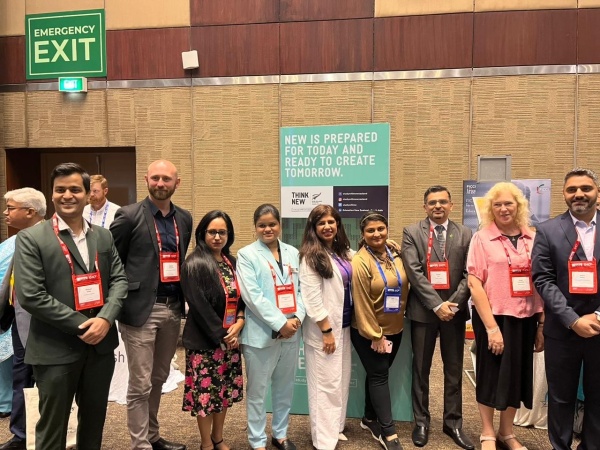
New Zealand universities India representatives at ENZ desk at the IC3 annual conference in Hyderabad on 23 August
The IC3 annual conference is India’s largest forum for school career counsellors and tertiary education providers to congregate, connect, network and deliberate on ethical career counselling practices for students. It provides a fantastic platform for international providers to educate and connect with key influencers for the undergraduate learners. As a gold sponsor at the IC3 conference, ENZ received greater visibility to showcase all New Zealand universities as well as the overall sector.
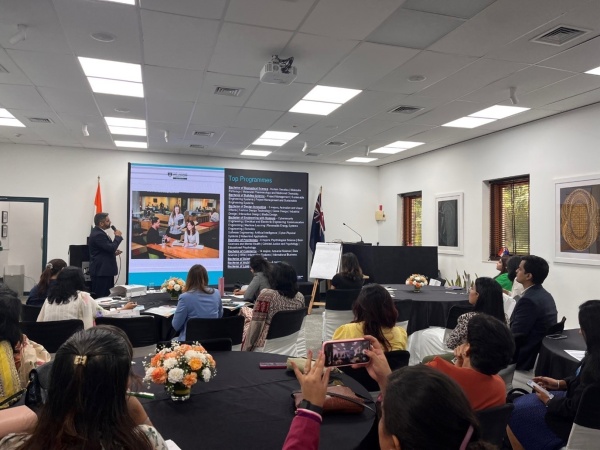
Ankit Mehta, International Recruitment Manager, Victoria University of Wellington presenting at the Delhi workshop
These initiatives are part of India’s rebuild and reconnect strategy, especially with a focus on the undergraduate market. The range of activities have supported an increased level of interest from premier high schools from across the country.
India is an established market for post graduate students. However, growing the undergraduate market requires a defined strategy as Indian students from the metropolitan cities are inclined to favour competitor countries like Australia, US, UK and Canada.
With the high investment and commitment shown by agents and the New Zealand higher education sectors, India can be a very promising undergraduate market for New Zealand.
ENZ will continue to create awareness of New Zealand among High school students through social media campaigns, newsletters, subject-ready reckoners, and the New Zealand Excellence Awards to regain the reputation and visibility that has been affected over the last couple of years.
For more information, please contact Jugnu Roy, ENZ’s Director of Engagement-East Asia and India, Jugnu.roy@enz.govt.nz
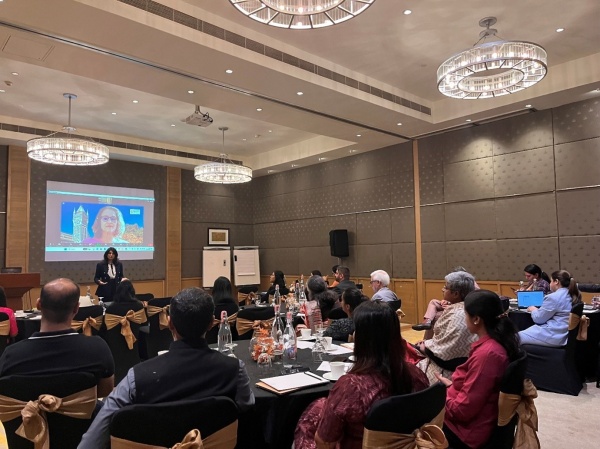
Jugnu Roy, Director of Engagement-East Asia and India interacting with counsellors at the Bengaluru workshop
-
Highlights from Education Fairs and events in Japan and Viet Nam
Japan
In early October, ENZ welcomed 844 visitors to engage with 40 New Zealand education providers representing the school, vocational, English language and university sectors at the first New Zealand student fair in Japan since 2019.
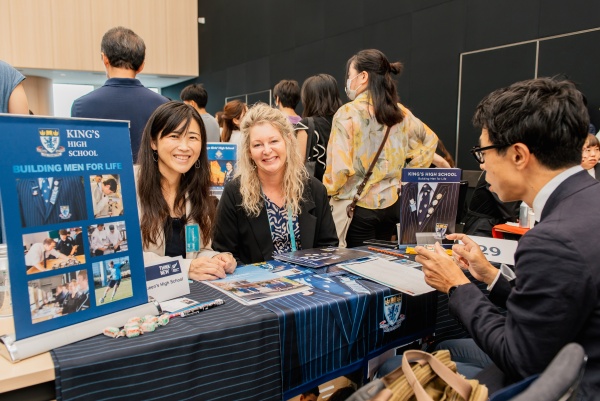
Teresa Robertson, International Director from King’s High School with Eriko Ishiguro, an interpreter.
The fair at Roppongi Academy Hills in Tokyo on 1 October had a programme of events that highlighted the strong connections between our two countries. Over the following two days, 49 and 45 of the visiting New Zealand education providers attended the ENZ Agent Seminars in Tokyo and Osaka respectively. Both seminars saw a record number of local agents and education providers, with 181 present in Tokyo and 77 in Osaka.
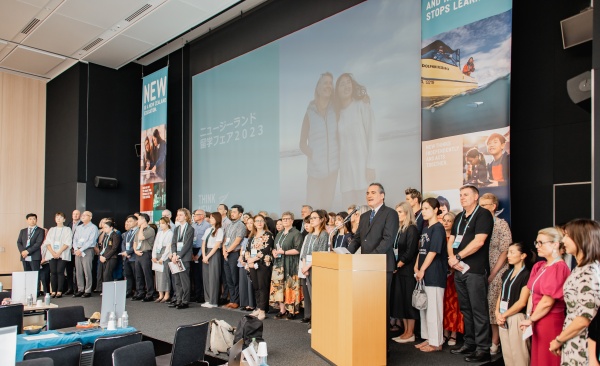
His Excellency Hamish Cooper, New Zealand Ambassador to Japan with the New Zealand contingent. The New Zealand education providers sang two waiata to support the Ambassador’s speech. A recording of ENZ’s waiata ‘Manapou ki te Ao’ was played and explained in Japanese to convey the waiatas’ meaning and lyrics.
Misa Kitaoka, ENZ’s Director of Education - Japan said that these events proved a great opportunity for the institutions to network with local school representatives, education and travel experts and gain valuable insights into the Japanese market. She also said that there was an evident increase in interest in long-term study in New Zealand both at the school and tertiary levels, compared with pre-Covid.
"This new trend is testament to the well-established presence New Zealand now has as a study destination in Japan. It can also be attributed to the effects of the Japanese government’s internationalisation policy in the education sector. With over 200 International Baccalaureate schools in Japan, more students are bilingual and eligible for direct entry to New Zealand universities.
There are also over 500 Japanese universities now adopting ‘sogo gata senbatsu’ (comprehensive admissions) that provide a holistic assessment of the applicants including their English language skills and overseas experience. This means that more students are choosing to complete secondary school education in New Zealand to apply to Japanese universities,” said Misa.
The education events along with pre-departure briefings where Japanese market insights were shared and the welcome reception upon arrival with key Japanese education stakeholders and partners were all well-received by the education providers in attendance.
Kerrie Hodgson, Internationalisation Business Partner, Te Pūkenga New Zealand Institute of Skills and Technology said it was clear that great effort was put into promoting the events and New Zealand education. “The numbers were high, and I felt that enquiries were more in depth than previous years, and beyond English Language study,” said Kerrie.
Renee Millner, International Director for Western Heights School in Rotorua added that the market insights provided ahead of their arrival were a great introduction to significant changes within the Japanese market.
Viet Nam
Following the action-packed week in Japan, the focus shifted to Viet Nam where the ENZ teams held several New Zealand education events in Ho Chi Minh City and Ha Noi.
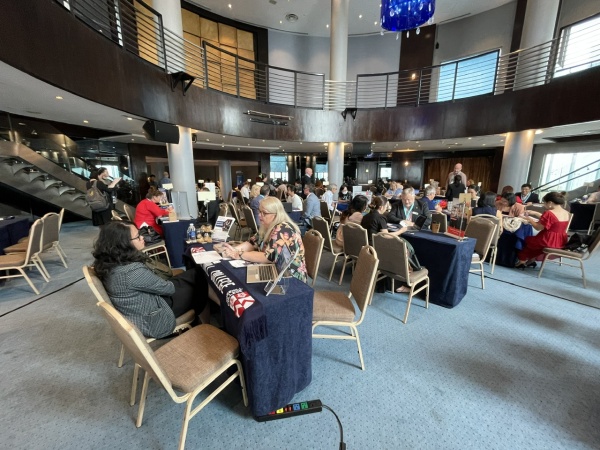
NZ institutions had one-to-one meetings with Vietnamese agents at two ENZ Agent Seminars in Viet Nam.
The series of events began with 19 NZ Masterclasses delivered over two weekends. Over 800 students registered for these online classes, in which New Zealand academics delivered a 40-minute lesson. This was followed by recruitment representatives introducing the entry requirements, scholarship opportunities and benefits of studying in New Zealand. Following the masterclasses, representatives of all eight New Zealand universities visited several schools in Ho Chi Minh City and Ha Noi, presenting to students and their families at information sessions and in some cases, taking part in mini-fairs.
Ho Chi Minh City was then host to two flagship ENZ events; the Agent Seminar and Counsellors Meet-up and following this, the NZ Education Day Fair. There was significant interest in both events with 50 Vietnamese agents meeting with 29 New Zealand institutions while 25 Viet Nam schools’ counsellors met with all New Zealand universities and Te Pūkenga. The New Zealand Education Fair saw over 500 visitors through the event with 385 leads generated.
Ha Noi followed suit with the Agent Seminar and Counsellors Meet-up attracting 40 Vietnamese agents meeting with 27 New Zealand institutions while eight Viet Nam school counsellors met with all New Zealand universities and Te Pūkenga. The events finished with a second popular Education Fair with visitors estimated at about 400 people resulting in 258 student leads.
Van Banh, ENZ's Market Manager for Viet Nam said that this year's education events had a mix of the traditional with a more interactive, modern, and sustainable approach which resonated well with attendees.
"Our team wanted to make these events as fun and interactive as possible to show what a New Zealand education is all about. In addition to the one-to-one opportunities for students and parents to talk to the New Zealand institutions, there were workshops with the participation of key opinion leaders, and well-known English IELTS trainers. There were also activities run by our partners such as English skills testing and minigames about New Zealand.
“We also took a more sustainable and innovative approach to our events to support the messaging that we communicate to students about New Zealand being a country that cares about sustainability and the environment, with an eye to the future through innovation. We replaced traditional printed backdrops with digital ones shown on TV screens for each booth, significantly reducing our waste and energy usage in manufacturing production. Our main stage also had a set of three interactive and eye-catching LED screens.
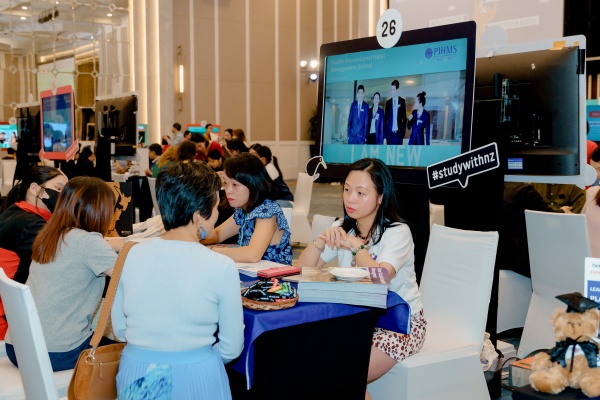
ENZ’s Regional Director for Asia, Ben Burrowes, attended both events and said, “on behalf of the ENZ teams in Viet Nam and Japan, I would like to extend a huge thank you to the New Zealand education providers who attended our events this year.
“As we all know, these face-to-face connections are extremely valuable as we continue to rebuild New Zealand’s education brand in such an important region for our sector. We look forward to hosting you again soon."
-
International Business
On this page are links to websites that have useful information to support businesses as they head overseas to international markets.
Business.govt.nz
For tools and expert advice from government and industry, this website is designed to help businesses save time and succeed. Home — business.govt.nz
New Zealand Trade and Enterprise
On this website, are market guides and events to support businesses with their export journey. NZTE helps New Zealand businesses grow in international markets
-
From the CE: A monumental year
Tēnā koutou katoa,
December already! Where did the past 12 months go?
The good news is that the effort that you have all put into this sector, that we are all so passionate about, has delivered results. My team tell me that enrolments for the first eight months of 2023, and the 12 months since the borders opened, have almost topped 60,000 (59,306 to be exact) and that the number of visa applications is much higher. From where we were when the borders opened this is significant and tangibly real, positive progress. It is also a positive indication for the future as many of these learners will be staying on into next year and are the foundation on which we can build further growth.
That said there is still much to do.
The recovery is not spread evenly across all sector participants and not spread evenly across New Zealand. While, at the time of writing, ENZ is yet to receive its letter of expectation from the new Government, international education was included as a manifesto focus area and I expect we will get very clear direction as to our role in continuing the recovery. This is good news too. Getting clear direction from Government enables us to know exactly what is expected and to focus our efforts accordingly.
In the short time that I have been in the CEO role, I have come to understand the importance of focus. There has never been and never will be a shortage of opportunities when it comes to international education. It is a matter of identifying the opportunity that delivers the impact and focusing our attention there. I look forward to receiving the new Government’s direction and delivering to it alongside our many partners.
The past 12 months have also been significant in the area of scholarships – the Prime Minister’s Scholarships for Asia and Latin America and the Manaaki New Zealand Scholarship Programme. Our scholarship programme was also bought to a standstill by COVID-19 and is itself recovering and recovering well. In 2023 more than 250 New Zealanders have been recipients of a Prime Minister’s Scholarship and more than 900 people from across the Pacific and Asia have participated in the Manaaki New Zealand Scholarship Programme with another 400 in the pipeline. As you know, ENZ administers these on behalf of the Ministry of Foreign Affairs and Trade. Both programmes successfully build enduring connections between New Zealand and our offshore partners and contribute to our communities here at home.
For all of us, our colleagues and our whānau, 2023 has been a monumental year. There is much that we can, and should, look back on with pride and satisfaction. On behalf of everyone at ENZ, I’d like to thank you for your support and for the huge amount of effort and work that has been achieved this year. I look forward to working with you in 2024 to continue the momentum towards an international education sector that is sustainable, resilient, and innovative, and of high value for students, providers, and all of New Zealand.
Ehara taku toa i te toa takitahi engari he toa takitini
It is not the strength of one person alone, but the strength of many that contribute to our success.
Ngā mihi,
Linda Sissons
Acting Chief Executive

